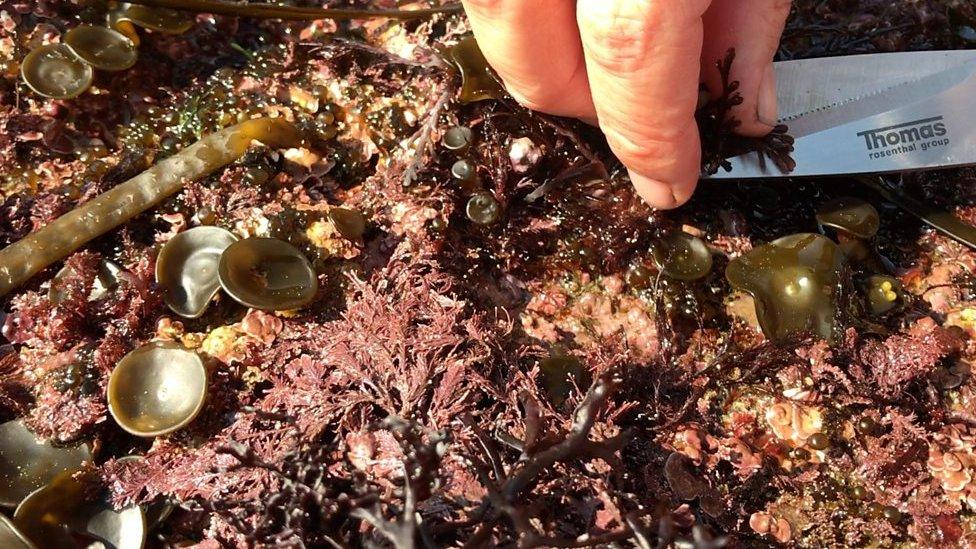Carlisle forager Jordan McKeating finds food in city park
- Published
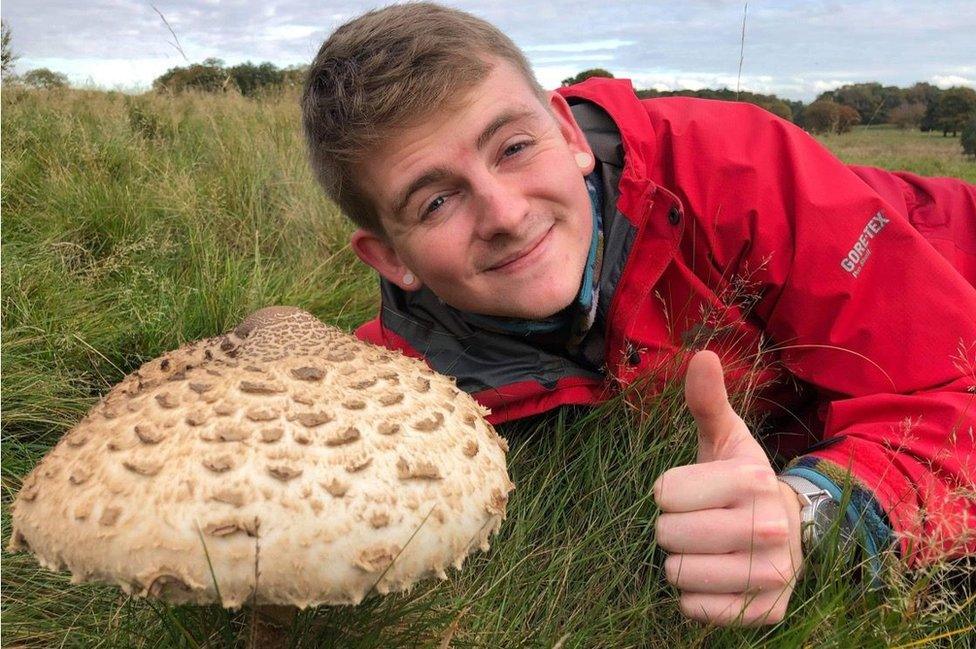
Jordan McKeating is a foraging expert
Jordan McKeating spends his days scouring open spaces for food. The BBC joined him in a city centre park for a forage, and learned why you should always follow expert advice.
Bitts Park is the green heart of Carlisle in the shadow of the city's 11th Century castle.
It is a place where children come to play, joggers use a shaded boulevard of trees to avoid the heat of an August day and people peer into the River Eden, hoping to spot the otters that live along the banks.
But beyond the manicured lawns and beds of colourful flowering plants, there are culinary treasures to be discovered.
Here I meet with Jordan McKeating, a 28-year-old tutor with Wild Food UK, external.
He has promised to take me on an urban safari, to rummage in the margins of the park for food and flavours that can supplement your diet throughout the year.
We start just yards from a busy interchange, traffic flowing in and out of the city centre on a weekday morning.
Beneath the shrubs, beside a wall, Jordan takes out a sharp knife and bends to cut a fungus from the ground.
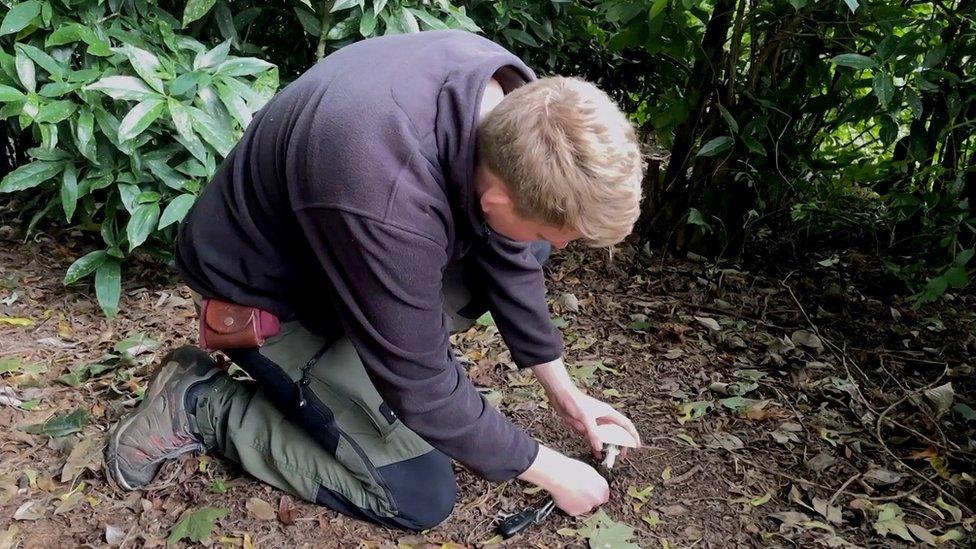
The first find of the day is a mushroom
At first sight, it strikes me as an ordinary field mushroom.
But Jordan is careful. He peels some skin back, holding the shiny white cap to his nose and sniffs, before passing it to me.
"Can you smell that? Can you smell something like aniseed?," he asks.
I can. For Jordan, it's one small sign that this mushroom is indeed edible and of a kind sold in shops.
He pops it into a cloth foraging bag pinned to his waist and says he will cook it later with herbs and cream.
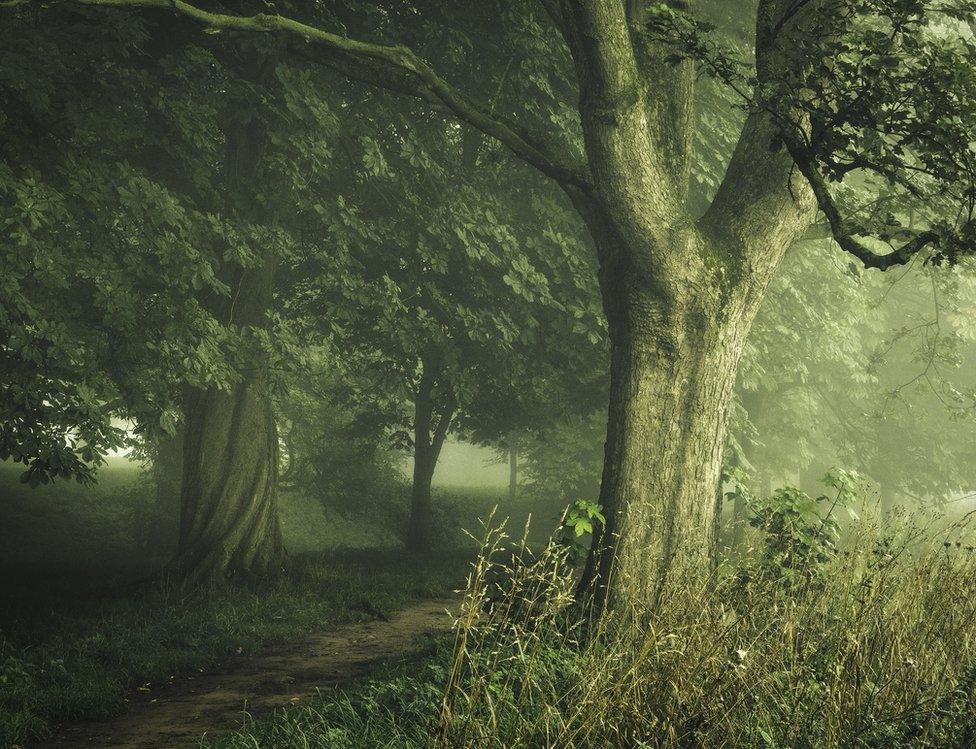
Bitts Park was opened in 1818
Nearby though are other fungi, potentially harmful, certainly not edible, and it's a reminder that while foraging is fun, you need guidance, knowledge and experience.
Jordan teaches across the north of England and Scotland, but was looking for a course to run in Carlisle and decided here was just the place to start to teach people what is safe and what is not.
"It's got some of the tastiest things that foragers go for," he says.
"But it's also got some of the deadliest things, and we like to show people the things to watch out for."
As the park slopes down to the tree-lined river, Jordan tells me that every spring the ground is covered in aromatic wild garlic.
Summer might be ebbing away into Autumn, but nature's bounty persists.
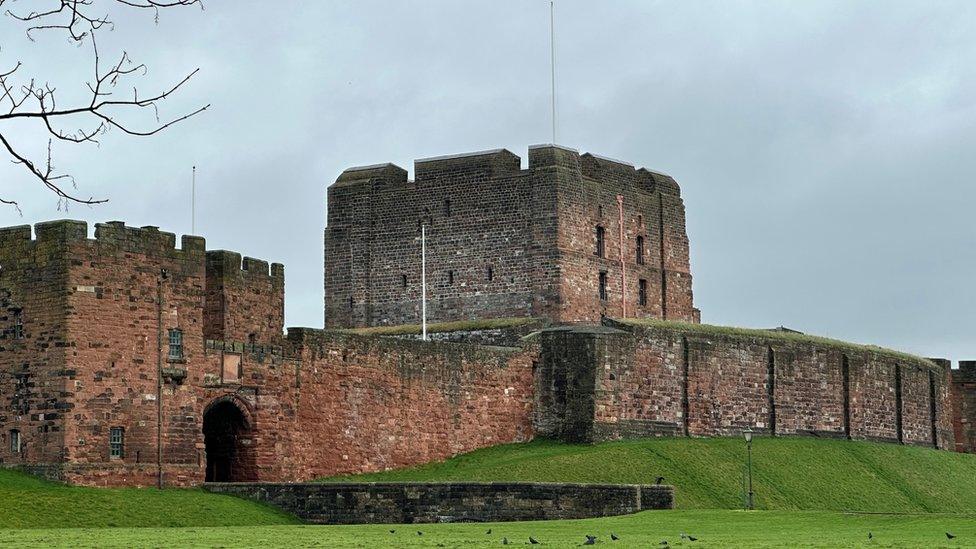
Bitts Park is behind Carlisle Castle
Jordan folds back grasses to pull a plant from the earth and cuts a small section of root for me to taste.
The tiny sliver of beige coloured shoot is wood avens, I learn.
"Recognise the flavour?" he asks.
I do, it's like cloves, traditionally a warm winter spice and ideal for a glass of mulled wine.
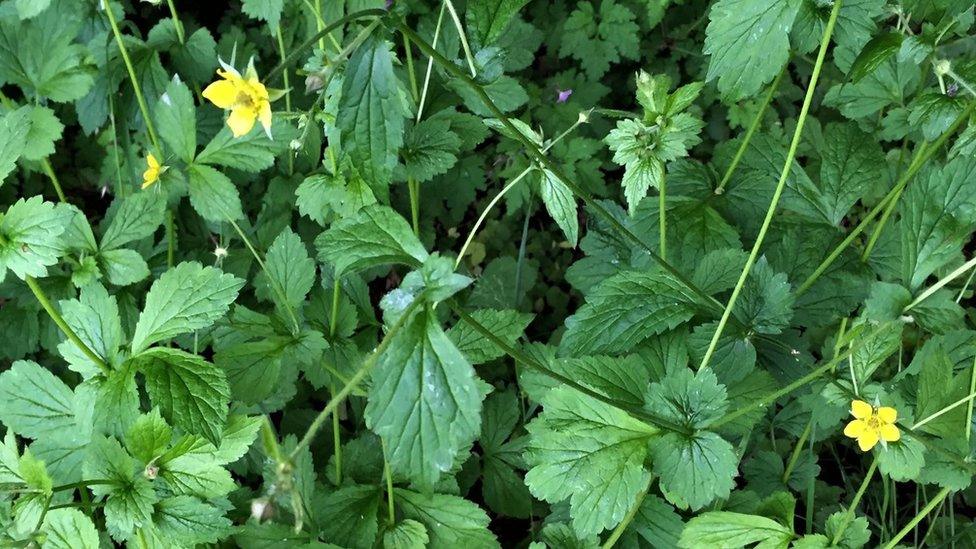
The roots of wood avens share a compound also found in cloves
Beside it, at ground level is a small, green plant with tiny, fern-like leaves.
Sweet cicely, occasionally a sugar substitute but with liquorice-like tones, is useful as a stuffing for baked or roasted fish.
Nearby, we come across the common plant Burdock. It can be pulled from the ground and its root roasted like potatoes or parsnips, a source of carbohydrate.
In the distance, traffic rumbles across Eden Bridge on the main road to Scotland, while the squeals and laughter of children can be heard in the playgrounds behind us.
I ask Jordan if he thinks most people would be surprised to discover so much food in an urban environment.
"Yes, absolutely," he says, adding: "I feel as if there's been a bit of a disconnect.
"It's very easy to just go and get what you need from the shops.
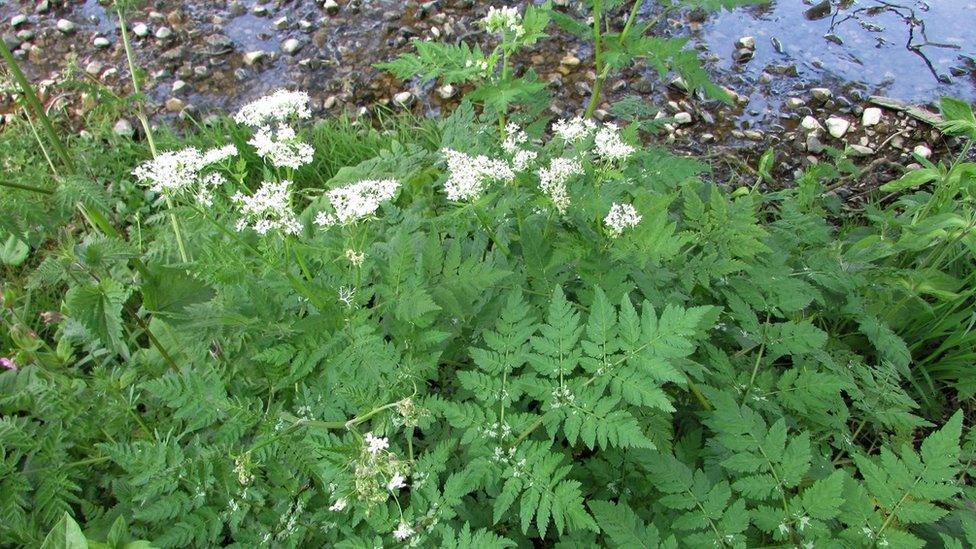
Foragers need to be careful and follow expert advice, as sweet cicely (pictured) for example has similar flowers to poisonous hemlock
"Foraging takes time, but it's incredibly rewarding. You can go home with a basket full of goodies, and it tastes better and it's so much healthier.
"There's no mileage, no plastic wrapped around it and it's just a healthy way to live.
"Everyone's budgets are really stretched at the moment, and I'm not saying this is a cure by any means, but it can take a chunk out of your weekly budget.
"And it's fun, an adult treasure hunt essentially."
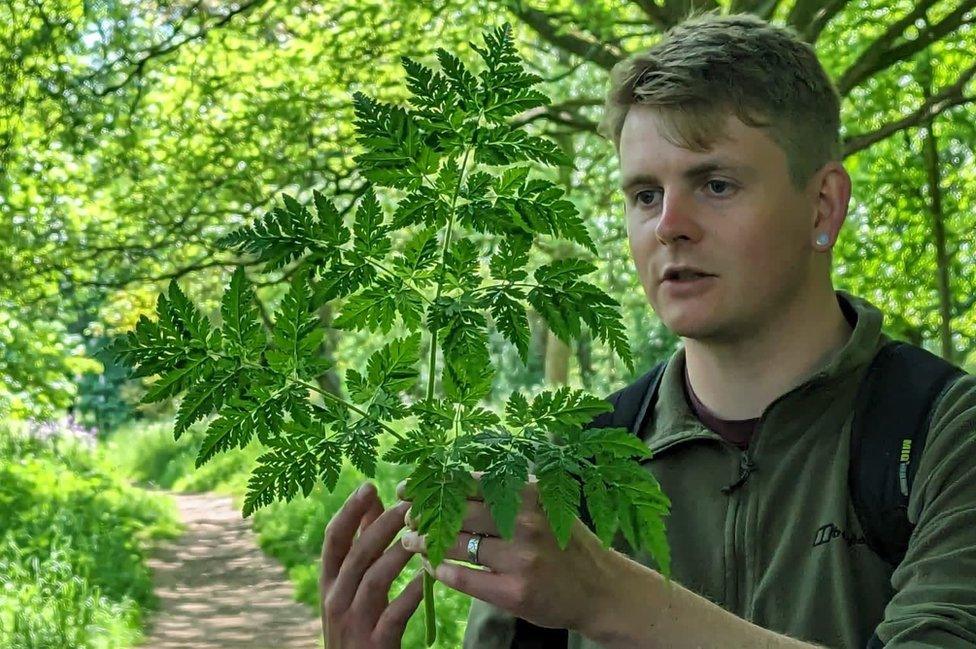
Jordan said people would be surprised by what can be eaten
Bitts Park was the first to be established in Carlisle, back in 1818, built by unemployed weavers to form a riverside walkway.
In places there are cherry trees and wild blackberries are plentiful - fruit enthusiasts can be spotted with bags bulging, full of nutrient-packed, free food.
But they are easy pickings for Jordan.
He is more enthused by trampling through the long grasses to find his favourite flavours.
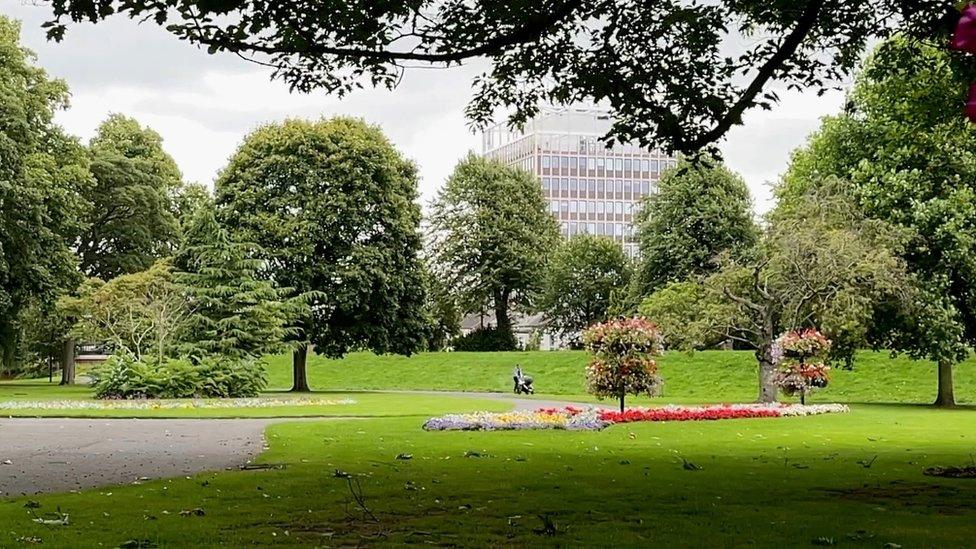
Bitts Park is in Carlisle city centre
"Ahh, here we are," he says, as the dew seeps through our boots in pursuit of another hidden treasure.
Jordan tears some leaves free from the ground, passing a handful to me.
"Go on, taste that," he encourages.
I crunch them between my teeth and immediately recognise a strong hint of apples and citrus. It tastes delightful.
"It's common sorrel," Jordan says, adding: "It's a really nice plant, it grows absolutely everywhere."
However, even in the confines of a managed urban park there are plants to be avoided at all costs too.
Beneath a riverside path, Jordan kneels a short distance from a sprawling plant and almost shudders.
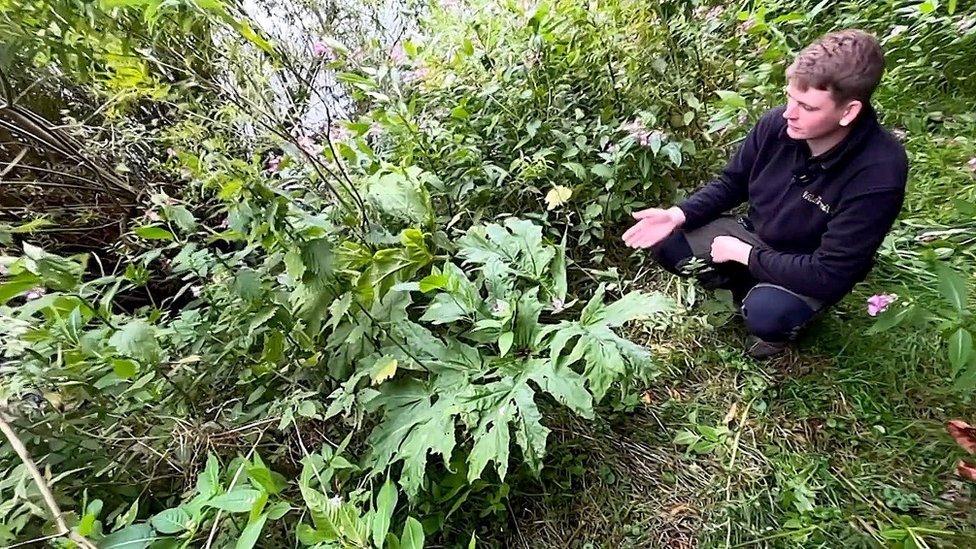
Jordan warned people against touching giant hogweed
"Giant hogweed," he says, adding: "This is a plant I wouldn't even touch.
"It can give you first-degree burns from the sap, or even just by pushing past it on a sunny day."
Foraging has changed Jordan McKeating's life after college and a succession of unfulfilling jobs in jewellers, factories, shops and restaurants.
"I don't work a day, I really don't," he says, adding: "I get to wake up in the morning and go to beautiful places like this, and I get to take people out and we eat some awesome food at the end.
"It really is a way of life."
He will be holding more courses in Bitts Park from the spring.

Follow BBC North East & Cumbria on Twitter, external, Facebook, external and Instagram, external. Send your story ideas to northeastandcumbria@bbc.co.uk, external.
- Published23 May 2023
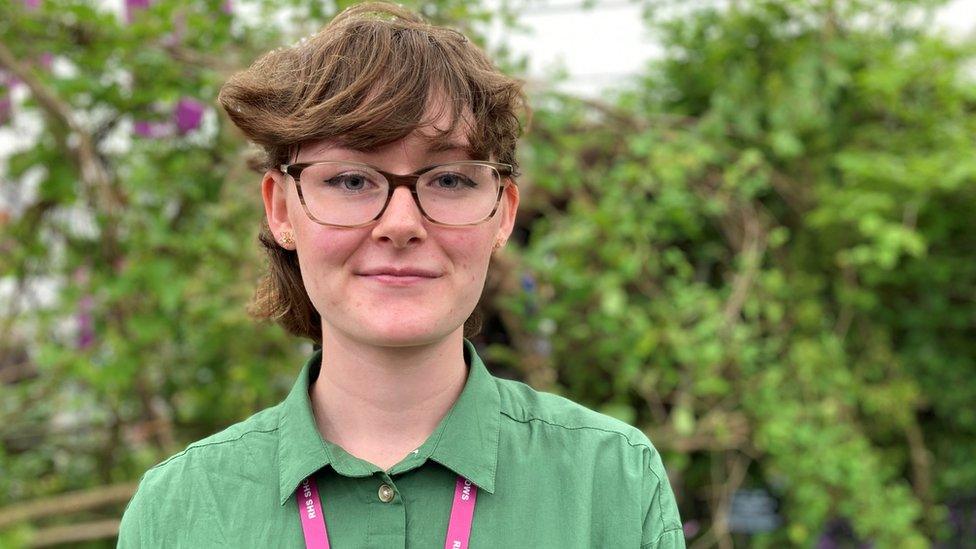
- Published1 December 2022
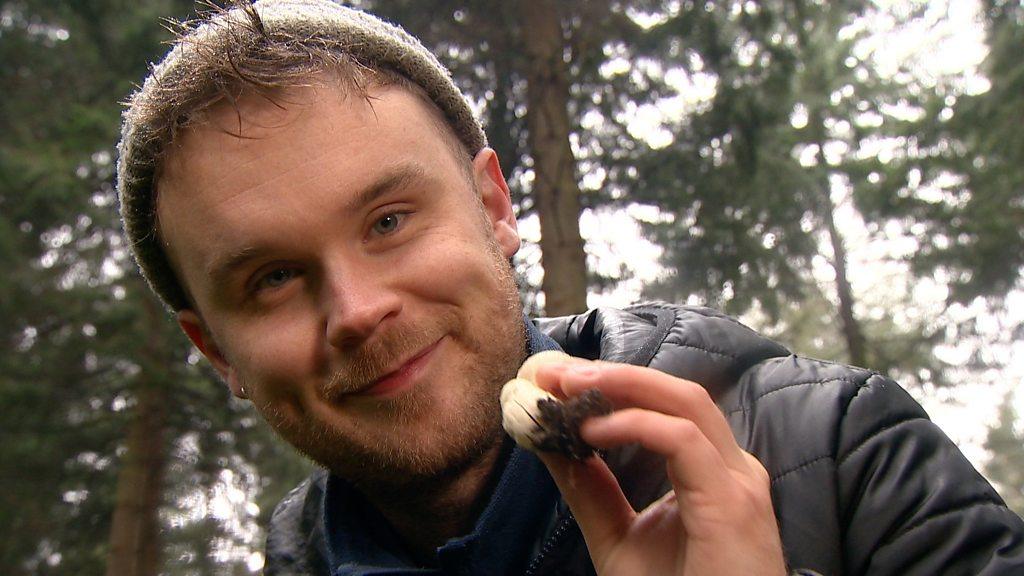
- Published22 September 2017
